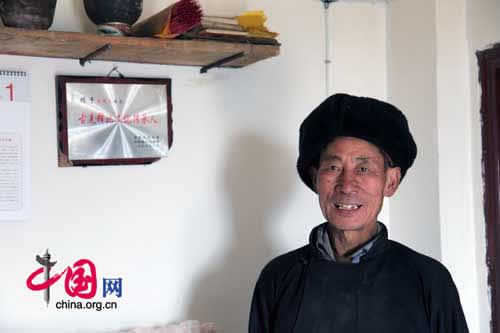The Shibi: guardians of ancient Qiang culture
The village of Luobo, home to around 1,000 people from the Qiang ethnic minority, lies in the high mountains just 20 kilometers from Wenchuan, the epicenter of the May 12 Sichuan earthquake. The earthquake wrecked every house in the village and killed 44 villagers. But following the quake, the local authorities were partnered with Jiangmen, a city in the prosperous coastal province of Guangdong. The Jiangmen government has helped rebuild the village at a cost of 30 million yuan (US$4.39 million).
 |
|
Pictures of a traditional Shibi ceremony held before the earthquake. [China.org.cn] |
The authorities have also acted to protect the traditional shamans of the Qiang – the Shibi – who are the guardians of Qiang culture.
The Shibi are both priests and the custodians of tradition. They preside over ceremonies at marriages, funerals, festivals, when babies are named and when new houses are built. Shibi are always male and must undergo strict training. Most importantly, they have to learn by heart the entire history of the Qiang and all their scriptures, because the Qiang language has no written form.
 |
|
The only surviving Shibi in Luobo Village, Wang Mingjie stands in his new home. The plaque says "The Inheritor of Qiang Shibi Culture." [China.org.cn] |
Luobo's previous Shibi, a 92-year-old man, died in the earthquake. He was succeeded by his 69-year-old apprentice Wang Mingjie. Wang lives alone in a new house built by the Guangdong government. His four children have all left home to find work outside the village. His daily routine consists of doing his housework and performing ancient ceremonies for the villagers.
Wang Mingjie's memories of the quake are still vivid and fear creeps into his voice as he recounts what happened. "My pigs didn't eat for several days before the quake came. On May 12 I went to check on them. As I stepped into the sty, everything began to shake. I stood stock still by the door frame reciting ‘Buddha, Buddha.' Fortunately the door frame saved me and I was not hurt. But my master died and the instruments we use for our ceremonies were buried." Wang said.
A silver plaque hanging on the wall of Wang Mingjie's new house says "The Inheritor of Qiang Shibi Culture." It was presented to Wang by the Wenchuan government in 2006. "I was given this title after passing an examination set by the government. I had to demonstrate my knowledge of our culture," Wang told China.org.cn. The government recognized the importance of protecting the Qiang cultural heritage after the start of the reform and opening-up policy. Wang Mingjie began to learn Shibi culture from his master around that time. "I helped my master with ceremonies during festivals and recited scriptures," Wang said. "Now I have four apprentices of my own. But they have gone to work in the cities because they lost everything they owned in the earthquake. The only chance I get to teach them is at Spring Festival."
|
New houses in the reconstructed Luobo Village. [China.org.cn] |
The Qiang people's ancient culture is facing a bigger threat than the earthquake; from modernization and urbanization. Teenagers go to high school in big cities and end up speaking Mandarin rather than the Qiang language. The village elders try to pass on their own language and culture during the school holidays. For its part, the local government is planning to invest 1.5 million yuan (US$220,000) to build a new cultural center and provide income support to cultural guardians such as Wang Mingjie. Last November, Luobo Village applied to be designated a "State-Level Cultural Relic Protection Site." The result of its application will be known by April.
Go to Forum >>0 Comments
 Add your comments...
Add your comments...
- User Name Required
- Your Comment
- Racist, abusive and off-topic comments may be removed by the moderator.
 0
0 







